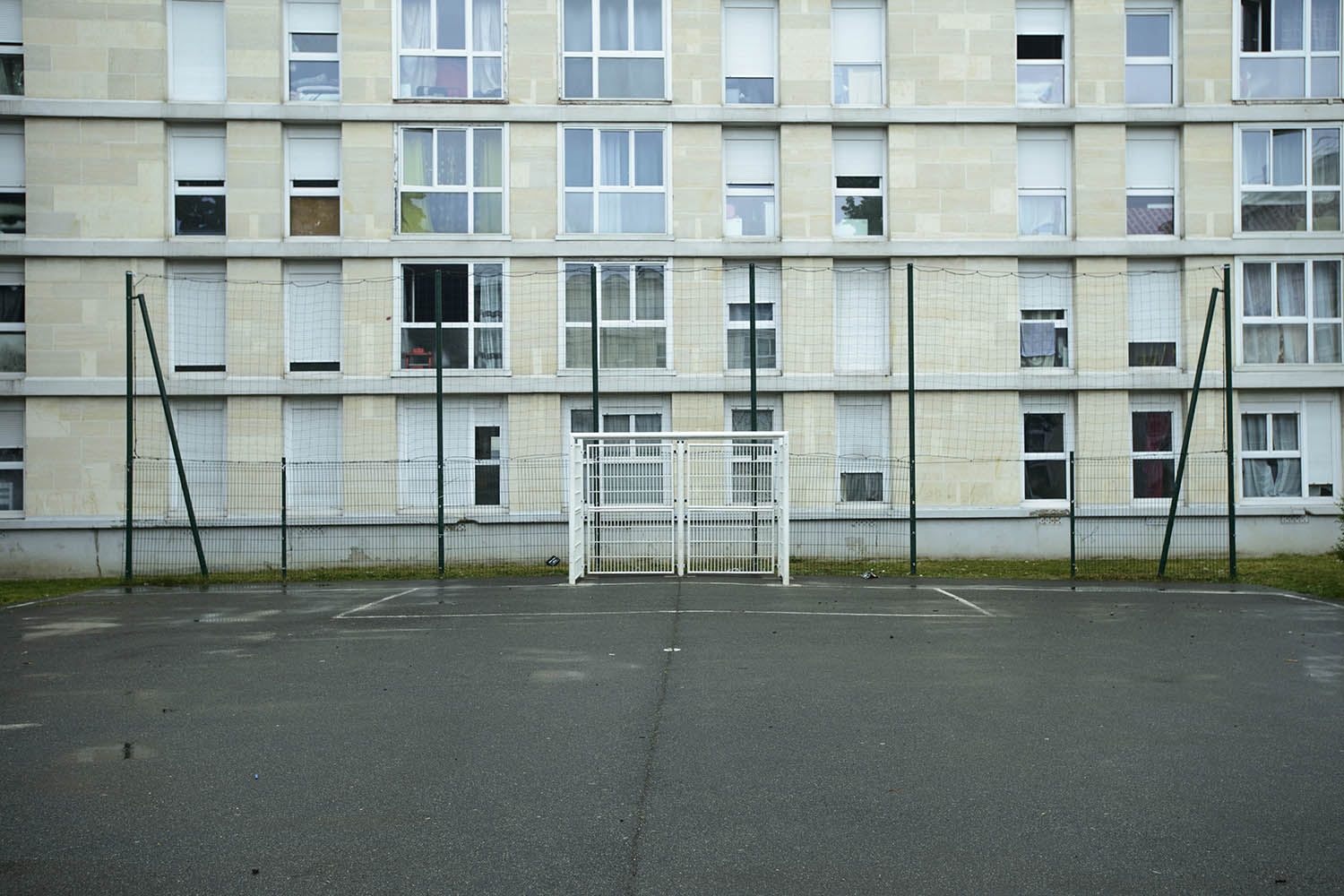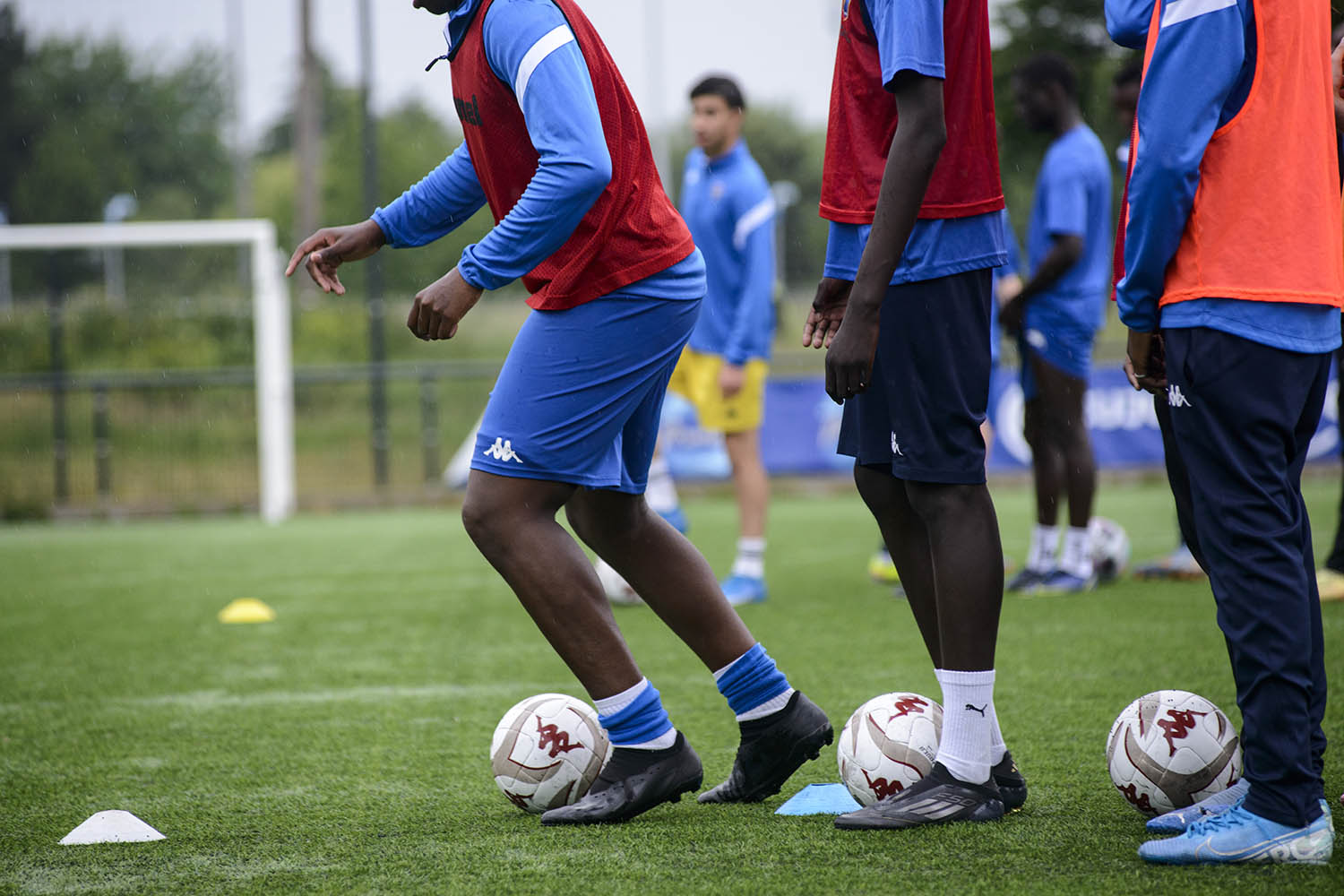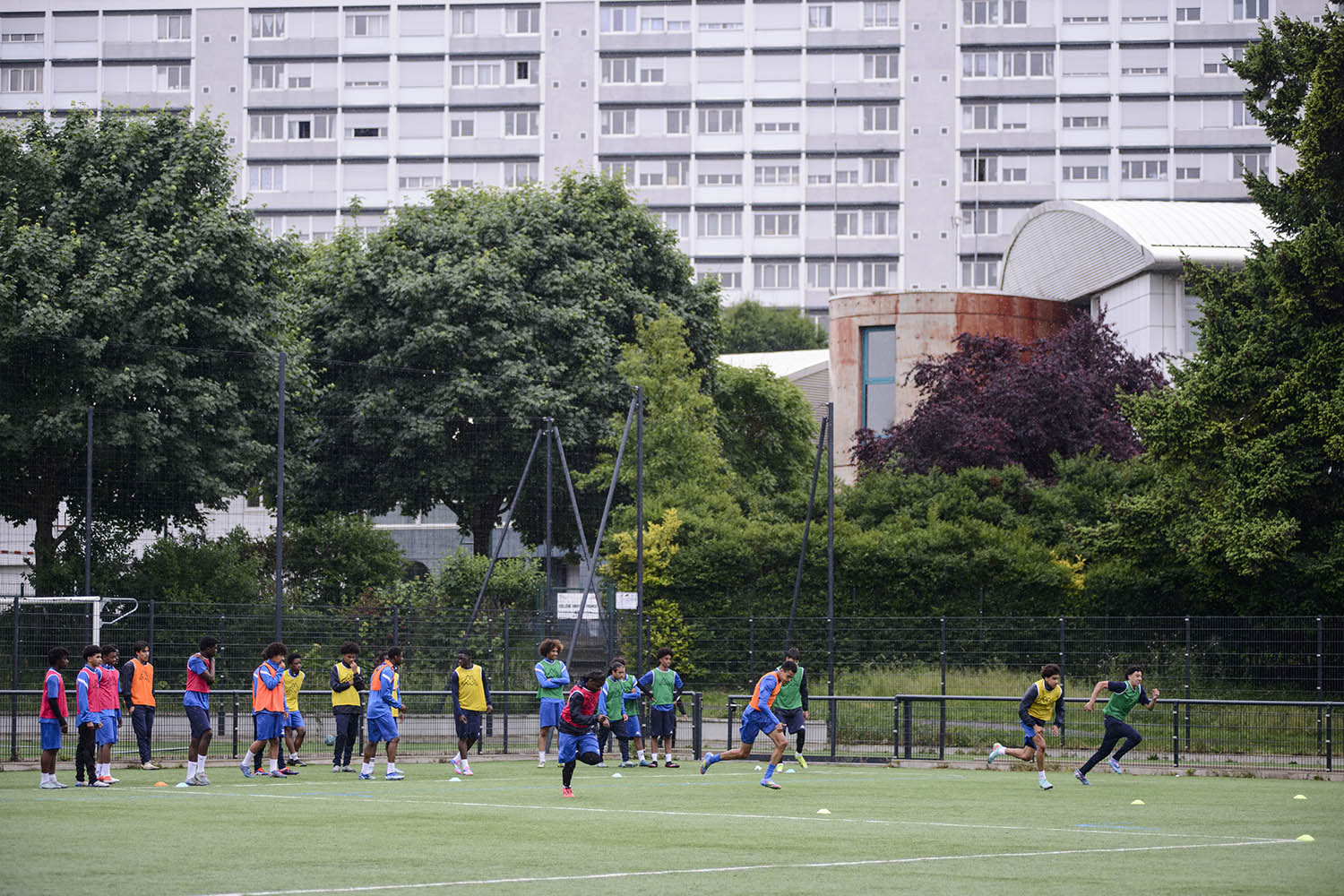Photographs by JB Russell/Panos Pictures
‘We still dream of Messi and Neymar,’ insist the 15-year-olds in the north-east Parisian suburbs on a grey, rainy Wednesday night. “We love them as players,” one lad explains. “But we prefer the team now,” he adds.
The discussion is next weekend’s Champions League final when Paris St Germain, their team (apart from one rogue Barcelona fan) take on Inter Milan in Munich, aiming to become only the second team from France to win a tournament conceived by French sporting grandees 70 years ago.
These teenagers, protégés of the AAS Sarcelles youth team, sense a change at PSG, a club artificially created as a franchise project in 1970 before becoming a Qatari public relations vehicle in 2011.
“There is more of a connection [with us] now than before,” one says. “Before, the players came from Brazil, from all over, now they have players from France, from Paris and they are more of a team.”
“Plus familiale,” interrupts one. “Plus soudée” says another borrowing an industrial metaphor: more welded together. “Before they had big heads, only thinking of their own career.”
That message will be well received by bosses at Paris St Germain, conceived by Qatar as a super team to sit alongside their 2022 World Cup, designed to familiarise the world with the Gulf state and, critics say, distract from numerous human rights abuses. The original idea, to win the Champions League with a team of Messis and Neymars, was rooted in global marketing strategies rather than communities like Sarcelles.
And yet everyone knows the greatest collection of young footballers lies on their doorstep, in the Parisian urban sprawl, the suburbs designed by socialist idealists rebuilding after the Second World War. Conceived as new model communities, they were largely populated by the wave of 1950s immigration from North Africa, the Caribbean and sub-Saharan Africa.
The approach to the youth club from Sarcelles train station, negotiating the bustling market of roasted chestnut stalls and exotic fruit sellers, is an avenue of the grey, monolithic housing blocks those idealistic architects conceived. If you squint you can capture their vision but the tenements are, 70 years on, as faded as their dreams, metal shutters rusting, concrete fraying at the edges. Disconnected economically, socially and, initially, literally, by a lack of transport links, the suburbs became perceived as a problem rather than utopia.

At JS Suresnes, where World Cup and Champions League winner N’Golo Kanté started out, secretary general Pierre Ville has served the club for decades and witnessed social changes first hand. The club is located more centrally, just north of the Seine across from the Bois de Boulogne and the elegant boulevards of high fashion. Suresnes is a mini-city on a hill, from which you can see the Eiffel Tour and PSG’s home stadium, the Parc des Princes. At times, Ville senses the unspoken tensions between sub-Saharan and North African communities, secular, Christian and Islamic cultures, simmering among players and parents. “But here talking politics and religion is banned!” he insists. “Football can bring people together.”
Newsletters
Choose the newsletters you want to receive
View more
For information about how The Observer protects your data, read our Privacy Policy
Sarcelles isn’t immune to suburban dislocation. In 2014, a demonstration in support of Gaza turned violent and the Paris riots of November 2005 also erupted here.
Yet that might seem like ancient history to the AAS Sarcelles Under-16s, more preoccupied with their upcoming Paris Cup final, probably one of the toughest youth football tournaments in the world. You can see why they have made it that far. Training is exceptional, the boys’ technique, strength and athleticism more akin to a Premier League academy than an amateur sixth-tier club. One boy in particular drills his passes with metronomic precision. “Lots of clubs are interested in him,” club president Boubacar Coulibaly comments. A 14-year-old went to PSG last year, another starts at Nantes this September.
If you have travelled to France by Eurostar, you have been through Sarcelles. Just before depositing you in picture-postcard Paris, the train speeds through the high-rise, quadrant-shaped housing estates which are makeshift football stadiums for local youths.
“I don’t know, but I think it’s different to London,” says Coulibaly. “There’s a huge rivalry between the different Parisian districts. There’s a lot of intensity in those games, like a World Cup final.”
Kids here get an early grounding. “I felt more pressure playing for Roissy-en-Brie against Pontault-Combault [the next-door suburb], than I did for a World Cup final,” said Paul Pogba, one of the most exalted graduates of the Paris suburbs, speaking after leading France to the 2018 World Cup win. Pogba’s explanation as to why the suburbs are so prolific acknowledges the issues of his community. “There is only football to help us,” he said in Simon Kuper’s book Impossible City.
‘It changed when Messi and Neymar left. Now the youth of Paris dream of playing for PSG’
‘It changed when Messi and Neymar left. Now the youth of Paris dream of playing for PSG’
Sarcelles train at the Riyad Mahrez stadium, for it is here the four-time Premier League winner honed his craft, rejected by big clubs before getting a chance at fourth-tier Quimper, in Brittany. That was the old PSG, ignoring their own for overseas stars. Kylian Mbappé was meant to be a suburban poster boy – he’s from Bondy, nine miles south-east of here – but was raised, football-wise, at AS Monaco, brought back to PSG at huge expense and left amid huge acrimony.
“It changed when Messi and Neymar left,” said Coulibaly. “Mbappé maybe came from Paris – but he dreamed of Real Madrid. But here, the youth of Paris dream of playing for PSG. For their mates, for their family.”

The superstar era does seem over. “Nasser just got tired of their behaviour,” said one executive close to PSG president Nasser al-Khelaifi. Messi was once suspended by the club for two weeks after he missed training because he was filming an advert for Saudi Arabia, while Neymar frequently developed injuries or was suspended in the week of Rio Carnival.
Earlier this month PSG fielded six teenage suburban graduates against Montpellier. “Warren Zaïre-Emery, from Montreuil down there [south],” says Coulibaly, running through the team. “Sonny Mayulu, he’s from Le Blanc-Mesnil, down the road, [Axel] Tape is from Bondy, Mbappe’s home, [Ibrahim] Mbaye is from Trappes [near Versailles] ... ”
Coach Luis Enrique, treble winner at Barcelona, where playing young graduates is part of the culture, has empowered the new generation. “The coach said without Kylian we’ll score more goals,” Zaïre-Emery said last week. “He was right. The danger comes from anywhere. We’ve created a team that works for each other and gives everything.” That Mbappé joined Real Madrid to win the Champions League and watches on as less exalted Frenchmen such as Désiré Doué and Ousmane Dembélé are poised to fulfil his dream has not gone unnoticed.
And if any club could repeat Jock Stein’s feat of winning the European Cup with a home-grown team, as Celtic did in 1967, PSG are one to do it. The new training centre recently opened in Poissy, the north-west of the city, is intended for such a feat. An education zone and dormitory facilities for out-of-town players are key features. Al-Khelaifi says he dreams of 11 Parisians winning the Champions League for PSG.
Not that you imagine PSG winning the Champions League, with or without home-grown players, will change much overnight for les banlieues. But the clubs such as JS Suresnes and AAS Sarcelles play their part in their communities. And their leaders insist a Champions League win would be significant. “It would be enormous!” said Ville.
“It would be important if they do it with Doué, Dembélé, Zaïre-Emery, with French players and players from Paris,” said Coulibaly. “For these boys, the dream is to play for PSG, even just for one day!”
It remains, of course, a fantasy for most. Yet seeing this team achieve the seemingly impossible still seems to touch the soul and allow them to dream.
